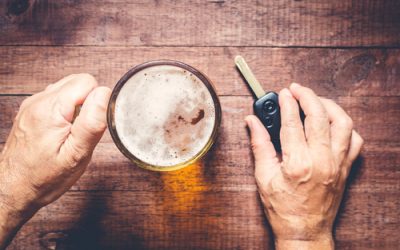
In many cases, you are legally allowed to be under the influence of alcohol or other legal drugs in public. It is only when you are perceived to be a problem for other people that the police may detain you. They may arrest you for public intoxication, or they may put you in custody for up to 72 hours for treatment and observation.
If you are detained for 72 hours in civil protective custody, you will not be charged with the incident. Although the stay in the “drunk tank” may not be pleasant, you won’t be facing criminal charges. However, not all jurisdictions in California have this option, and police may opt to charge you with public intoxication if you are unruly.
If you’ve been charged with a DUI, a criminal defense lawyer may be able to argue for a public intoxication charge. A public intoxication charge is still a criminal charge, but it carries less severe penalties than a DUI. However, it may only be a possibility in certain circumstances, so contact our Los Angeles DUI lawyers for help.
Understanding What Constitutes Public Intoxication
Public intoxication is a charge found in California Penal Code Section 647. While many people assume this public intoxication law only applies only to people under the influence of alcohol, it covers any substance that might impair your cognition. This section of the penal code also allows police officers to detain individuals in civil protective custody for up to 72 if they are suspected of public drunkenness.
Penal Code Section 647(f) does not make it illegal for an individual to be impaired in public. What the law does say is that a person may be arrested if:
- The intoxication prevents them from being able to care for their own safety or for the safety of others
- The intoxicated individual obstructs or otherwise interferes with the use of public ways
In the context of Penal Code Section 647(f), a public way includes:
- Sidewalks
- Streets
- The hallway of a building open to the public
- Any other location where the public freely travels
The wording of the law allows the police to arrest an intoxicated person for being drunk in their car. Even if the officer has no evidence that you were driving drunk, sitting in a car on the side of a public road is valid grounds for a public drunkenness charge and a criminal offense.
Penalties for a Public Intoxication Charge
When an intoxicated person is charged with public drunkenness, they may face the following penalties:
- Up to six months in county jail
- Up to $1,000 in fines
Depending on the circumstances of the arrest and how you argue the criminal offense charges, a judge may waive the jail sentence for probation.
Why DUI Lawyers Sometimes See a Public Intoxication Charge as a Victory
A public intoxication conviction is likely to impact your life. It is a misdemeanor, meaning that it will appear on your criminal record. It may also mean a $1,000 fine and the possibility of jail time.
However, if faced with a DUI conviction, a lawyer may argue for a public intoxication charge instead. If a law enforcement officer found you intoxicated in your car, he or she may have charged you with a DUI. A DUI conviction carries harsher penalties, particularly if you have been convicted of a drunk driving charge in the past.
Arguing for a Public Intoxication Charge
In arguing for a public intoxication charge, your criminal defense attorney is seeking its lesser penalties. Whereas a DUI will impact your ability to drive and get or keep your job, a public intoxication charge will not impact your driving record. It also means that you will not have a prior DUI on your record, which enhances your possible penalties if you face DUI charges again in the next 10 years.
The penalty period for a public intoxication charge may be shorter. Once you have completed either your jail or probation sentence, you may seek to have the charge expunged from your criminal record.
Common Criminal Defense Strategies Our Experience Attorneys May Utilize
When facing a public intoxication charge, several criminal defense strategies can be employed to mitigate the consequences or potentially have the charges dismissed. Here are some common defense strategies:
- Lack of evidence: Challenging the prosecution’s ability to prove beyond a reasonable doubt that the accused was intoxicated in a public place. This could involve questioning the reliability of witness testimony or the accuracy of chemical tests.
- Private property: Arguing that the individual was not in a public place at the time of the alleged offense. If the incident occurred on private property, such as a residence or business, it may not meet the criteria for public intoxication.
- No disruption or danger: Demonstrating that the individual’s behavior did not pose a danger to themselves or others, nor did it disrupt the peace. This could involve providing evidence of responsible behavior despite intoxication.
- Unlawful search and seizure: Challenging the legality of law enforcement actions leading to the arrest, such as an unlawful investigative stop or search. If evidence was obtained through unconstitutional means, it may be suppressed in court.
- Medical condition: Presenting evidence of a medical condition or reaction to prescribed medication that mimicked signs of intoxication. This could include testimony from medical professionals or documentation of the condition.
- Mistaken identity: Asserting that the individual arrested was not the person who was intoxicated or causing a disturbance. This defense relies on providing alibis or other evidence of misidentification.
Each case is unique, and the effectiveness of these defense strategies depends on the specific circumstances surrounding the arrest and the jurisdiction’s laws. Consulting with a qualified criminal defense attorney from our legal team is crucial to determining the best approach for defending against public intoxication charges.
Speak with a DUI Lawyer About Your Options
If you’ve been charged with public drunkenness, this isn’t the end of the road. Our Los Angeles DUI lawyers may be able to fight your public intoxication charges.
If you have been accused of a DUI in Los Angeles, contact us. We can help you connect with a highly skilled criminal defense lawyer who can help you explore your legal defense options.






